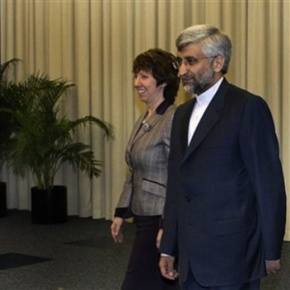The Undeniable Consequences of the Economic Sanctions

IRD: The last round of talks between Iran and the P5+1, which were held in Turkey last February, faced semi-failure. During the past few days a new series of correspondence between Mrs. Ashton and Mr. Jalili has been taking place. While the previous talks ended in failure, why do you think this correspondence is occurring?
HB: All UN Security Council Resolutions explicitly state that the option of negotiation is available despite sanctions, and asks the Iranian government to negotiate.
Therefore, the representatives of both sides have established relations. They try to keep the option of negotiations on the table, and they never announce that negotiations will halt. This correspondence is also n attempt to revive the negotiations. Therefore, they have announced that they are ready to receive Iran’s new proposals.
IRD: So is it possible that negotiations may begin soon?
HB: Based on Iran’s response and the position taken by Western countries, the probability picking up negotiations is not high. They have announced that Iran’s response does not propose a new idea, therefore there’s no necessity for restarting the negotiations.
IRD: What was Iran’s response that was encountered with such a reaction by the West?
HB: Iran’s response includes general ideas on cooperation on the war against terrorism and the nonproliferation of nuclear weapons, especially in the Middle East region, which refers to Israel’s nuclear activities. Iran proposes a general idea which has little logical relation with the disputed issue.
Nevertheless, Iran’s dispute with the West is on its nuclear issue. The disputed issue is that the West sees the problem only in Iran’s nuclear dossier while Iran’s focus is mostly on the generalities and changes in global management. Iran’s proposal encompasses different subjects on global management, which differ from what the West has in mind as the subject of the negotiations.
IRD: It seems that the enthusiasm in the West for negotiations has also decreased--isn’t this right?
HB: Generally, Iran’s nuclear issue has gone out of the spotlight. We can refer to three issues regarding this case. The first issue is that with the popular uprisings in the region, the issue of human rights has gained importance and priority. This is while Iran’s nuclear case was covered by most media prior to these events. Currently, the media focuses on these uprisings and the human rights issues regarding them.
In addition to that, the Fukushima nuclear crisis also created doubts in using nuclear energy. The Stuxnet virus and the damage it caused in Iran’s nuclear sites is also among the reasons why the importance of Iran’s nuclear activity is reduced.
Besides, the West is focusing on sanctions imposed on Iran to control its nuclear activities.
Due to these facts and the resulting reduced attention to Iran’s nuclear activities, I doubt the occurrence of any major changes in the near future.
IRD: You referred to the sanctions and the fact that the West is focusing on implementing sanctions on Iran. To what extent have these sanctions been effective?
HB: The West is busy implementing the sanctions imposed on Iran by the UN Security Council. Recently, there have been disputes over the Iranian-European bank in Hamburg. The fact that the sanctions were effective and had consequences in Iran’s economy is real and cannot be ignored. Surely these sanctions have caused damage to Iran’s economy and trade, but they have not been able to bring Iran to the negotiation table.
IRD: Are further sanctions and Resolutions possible in case Iran and the West do not begin new negotiations?
HB: This possibility seriously exists, albeit no serious sign has been observed yet. But when negotiations reach a deadlock, more serious sanctions (imposed by the Security Council) are possible, to show that the issue is not forgotten.

